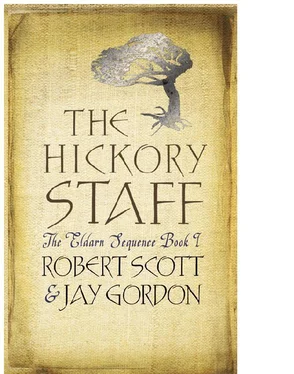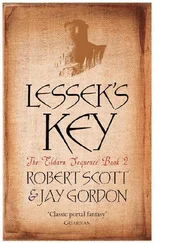Rob Scott - The Hickory Staff
Здесь есть возможность читать онлайн «Rob Scott - The Hickory Staff» весь текст электронной книги совершенно бесплатно (целиком полную версию без сокращений). В некоторых случаях можно слушать аудио, скачать через торрент в формате fb2 и присутствует краткое содержание. Жанр: Фэнтези, на английском языке. Описание произведения, (предисловие) а так же отзывы посетителей доступны на портале библиотеки ЛибКат.
- Название:The Hickory Staff
- Автор:
- Жанр:
- Год:неизвестен
- ISBN:нет данных
- Рейтинг книги:4 / 5. Голосов: 1
-
Избранное:Добавить в избранное
- Отзывы:
-
Ваша оценка:
- 80
- 1
- 2
- 3
- 4
- 5
The Hickory Staff: краткое содержание, описание и аннотация
Предлагаем к чтению аннотацию, описание, краткое содержание или предисловие (зависит от того, что написал сам автор книги «The Hickory Staff»). Если вы не нашли необходимую информацию о книге — напишите в комментариях, мы постараемся отыскать её.
The Hickory Staff — читать онлайн бесплатно полную книгу (весь текст) целиком
Ниже представлен текст книги, разбитый по страницам. Система сохранения места последней прочитанной страницы, позволяет с удобством читать онлайн бесплатно книгу «The Hickory Staff», без необходимости каждый раз заново искать на чём Вы остановились. Поставьте закладку, и сможете в любой момент перейти на страницу, на которой закончили чтение.
Интервал:
Закладка:
To make matters worse, today was going to be especially dismal. His boss, the estimable Howard Griffin, had directed him to oversee a complete audit of all open account files – some going back as far as the bank’s original customers in the 1860s. Steven had started the job the previous day; he anticipated a great deal of tedious secretarial work with little reward.
‘You’ve got leadership potential, Steven. I want to see you taking on more projects like this in the future,’ the bank manager had told him with enthusiasm.
But Steven was finding the assignment was disillusioning him even further, increasing his distaste for a career in finance.
‘Who could be inspired by this?’ he said to himself as he switched on the lights and crossed the lobby floor to the aged pine window and counter top.
Pushing the stack of files through his window, he re-crossed the lobby and switched on the illumination for the display case hanging on the opposite wall. It held grainy photographs showing mine workers, and some hand tools found in the LATGO mines on the northern wall of Clear Creek Canyon, as well as the original ownership papers for the bank, a photo of Lawrence Chapman, the founder, and several pages of accounting ledgers from the original books. Steven rarely considered the items, but he was glad customers had something to look at while they waited in line.
The condition of his shoes this morning made him pause and consider one photo, of Lawrence Chapman and a bank employee. The man wore a uniform with awkward-looking boots, a frilly white shirt, suspenders and a large belt buckle with the letters BIS clearly visible on the front.
‘Well, my shoes may be wet and smell of cappuccino, but at least I’m not wearing that get-up,’ Steven said, wandering towards his office.
Checking his e-mail, Steven found a message from Jeffrey Simmons, the doctoral student in Denver who shared Steven’s only real passion, abstract mathematics concepts.
‘You work in a bank, dress like a philosophy professor from the ’50s, and you love abstract maths. I’m surprised you don’t have to beat the women away with a slide rule,’ Mark would tease him.
Even though his roommate couldn’t appreciate the beauty of calculus or the genius of a good algorithm, Steven liked Mark immensely; the two had shared an apartment ever since Steven had returned to Idaho Springs. To Steven, Mark Jenkins was the perfect history teacher: he possessed an enormous body of knowledge and had a razor-sharp wit. He thought Mark was the most knowledgeable and quick-thinking person he knew – not that he would ever admit that to Mark.
Jeff Simmons, on the other hand, fully understood the joy of a complex equation: the mathematician often sent Steven problems to consider and solve in an infuriatingly uncomfortable deductive paradigm. This morning’s message was no exception. It read: ‘You use them both every day but probably have never considered why the numbers on your cellular telephone and your calculator are organised differently.’ Steven was about to pull a calculator from his desk drawer when he heard the bell above the lobby door chime as someone entered the bank.
‘Stevie?’ Howard Griffin, at only 8.10 a.m.? He was early this morning, which meant he hadn’t taken time to exercise on his Stairmaster before leaving for work. Steven smiled at the irony of anyone owning a stair machine while living in Idaho Springs: the entire city was constructed on an incline at 7,500 feet above sea level, with mountains on either side of Clear Creek Canyon rising to over 12,000 feet. He liked to think Griffin had lost some sort of bet with the Devil and had to climb his eternal stairway, a corpulent, baby-boom Sisyphus, rather than just go outside for a walk each morning, but he knew better. Griffin had moved to Boulder from New Jersey in the 1960s. When he discovered the decade would not last for ever, he enrolled in the University of Colorado, completed his degree and moved to Idaho Springs to become manager of the small town’s bank.
Now, at fifty-five, Griffin was bald and had a burgeoning paunch that he battled every morning as he climbed Colorado’s highest peak, the Mount Griffin Stairmaster. His commitment to exercise was admirable, but he had a weakness that regularly bested his determination to regain the thinness of his youth: Howard Griffin loved beer, and most afternoons would find him propping up the bar at Owen’s Pub on Miner Street. Steven sometimes accompanied him, and Mark would join them for a few beers or the occasional dinner.
‘Stevie?’ the bank manager called again, and Steven moved into the lobby to greet his boss.
‘Good morning, Howard. How are you?’
‘Never mind that. I’m fine, thanks, but never mind that,’ Griffin often thought faster than he could speak. ‘Myrna called last night and can’t be in today. She’s sick or something. So I’ve had to come and cover. How’s the audit coming?’
‘It’s fine. I have all the active accounts pulled. There are thousands of them, by the way. I’ll get through many of the oldest today, because most of those haven’t had much in the way of transactions since they were opened. They’ve made enough interest to cover the monthly fees, so the cash just sits there.’
‘Great. Stay on it. I’ll work the window and we can check in over lunch later. How’s Owen’s for you?’
‘That’ll be fine, Howard. I’ll appreciate the break.’ Steven returned to his office, retrieved the keys to the basement and braced himself for a long, tedious morning.
‘Take a look at these.’ Steven had brought several pages of notes to lunch. ‘We have twenty-nine accounts that haven’t had a single transaction in the past twenty-five years. Most of them are forgotten accounts, people who have died. Thankfully, I have information on next of kin from the original applications. But eight of them appear to be accounts for single men killed in the Second World War, and, get this, five accounts date back to the late 1800s – one of which had one deposit and no additional transactions.’
‘I’m not surprised,’ Griffin said between long draws on an enormous draught beer. ‘It was probably some miner who went back to work and got himself killed, got his claim jumped or something. It was a rough time back then. But those assets are among the reasons this bank survived the depression – those and the molybdenum mines.’
‘That’s not the worst of it, Howard,’ Steven interrupted. ‘This account had only one deposit, but it was a deposit of more than $17,000. That was nine hundred pounds of refined silver. The bank made a bundle on the silver sale alone, because they screwed the guy for over ten cents an ounce off the market price.’ Steven paused to take a bite of a thick Reuben sandwich. Continuing with his mouth full, he added, ‘This is the part that doesn’t make sense. What mining company sends a guy in with nine hundred pounds of silver, lets him take a loss of ten cents an ounce, and then never comes back for the cash? To top it off, he wasn’t even from the Springs. This guy was from Oro City. I don’t even know where that is.’
‘Was, Stevie, was. Oro City was Leadville, but they changed the name in 1877. You’re right, though, something’s crooked. There were banks in Oro City then, so what was this guy doing over here?’ Griffin finished his beer and motioned for Gerry, the bartender, to draw him another. ‘You want one more?’
‘Jeez, no, Howard. It’s only 12.20; I have to go back to work.’
‘Well, I often question my own behaviour, but I’m still having one more before we go. Anyway, this account, what’s the big deal? Some miner hits it big – huge – drops off most of his haul at the bank, takes a handful of silver with him to the pub, flashes it around, drinks too much hooch and gets himself killed. It happened all the time, I would guess.’ Griffin rubbed a French fry around his plate, sopping up hamburger grease.
Читать дальшеИнтервал:
Закладка:
Похожие книги на «The Hickory Staff»
Представляем Вашему вниманию похожие книги на «The Hickory Staff» списком для выбора. Мы отобрали схожую по названию и смыслу литературу в надежде предоставить читателям больше вариантов отыскать новые, интересные, ещё непрочитанные произведения.
Обсуждение, отзывы о книге «The Hickory Staff» и просто собственные мнения читателей. Оставьте ваши комментарии, напишите, что Вы думаете о произведении, его смысле или главных героях. Укажите что конкретно понравилось, а что нет, и почему Вы так считаете.












